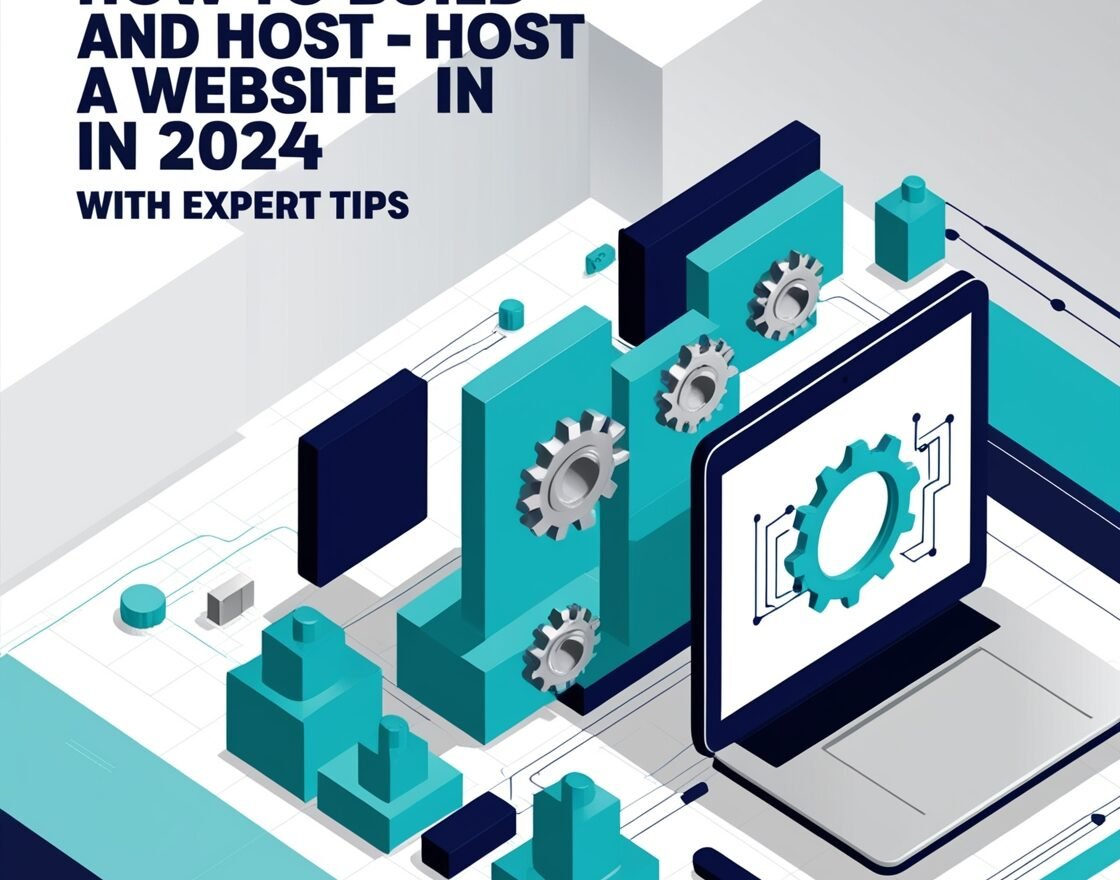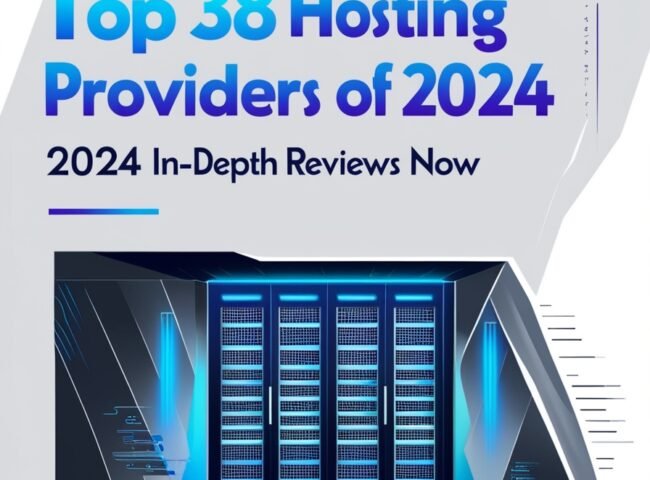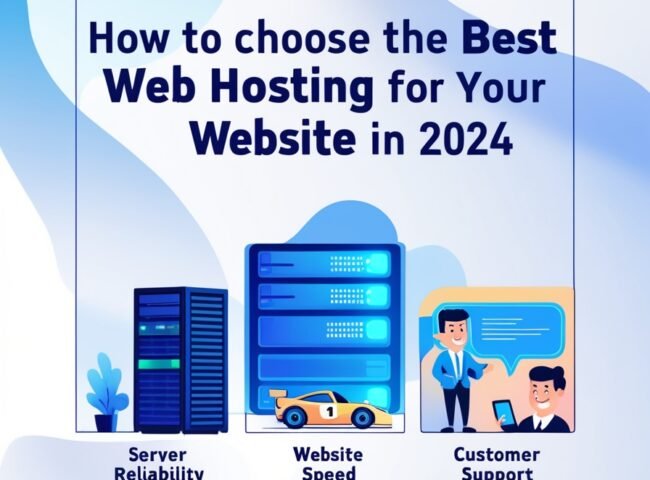How to Build and Host a Website in 2024 with Expert Tips
Building a website is an essential step for businesses, bloggers, and entrepreneurs looking to establish an online presence. But before you can launch a website, you need web hosting, which plays a vital role in determining your website’s performance, security, and scalability.
This comprehensive guide will walk you through the ins and outs of web hosting, helping you make informed decisions as you start building your website. Whether you’re a complete beginner or someone looking to enhance your web hosting knowledge, this guide will cover everything you need.

1. What is Web Hosting?
At its core, web hosting is a service that allows individuals or businesses to post a website or web page onto the internet. A web host (or hosting provider) is a company that provides the technologies and services needed for the website to be viewed on the internet. Websites are stored (or “hosted”) on special computers called servers.
Think of it like renting space on the internet for your website. When users want to visit your website, all they need to do is type your website address (domain name) into their browser. Their computer will connect to the server where your site is hosted, and the server will deliver the site back to their browser.
Key Terms to Understand:
- Domain name: Your website’s address, like www.example.com.
- Server: A powerful computer that stores and serves your website to visitors.
- Hosting Provider: The company that provides the server and other related services.
For a beginner-friendly introduction, watch Hostinger Academy’s tutorial on what web hosting is. It’s an excellent video resource for grasping the basics of how web hosting works.
2. Why is Web Hosting Important?
Your choice of web hosting significantly impacts your website’s performance, uptime, and security. Think of hosting as the foundation for your website—if it’s weak or unreliable, your entire site suffers.
Here’s why web hosting is so critical:
2.1. Website Speed and Performance
Speed plays a crucial role in the success of your website. Users expect websites to load quickly, and search engines like Google prioritize fast-loading sites in search rankings. A slow website can result in poor user experiences, increased bounce rates, and fewer conversions.
Hostinger, for example, is known for its fast load times, which are essential for both user experience and SEO optimization.
You can learn more about how hosting affects speed and SEO in this Hostinger Academy video.
2.2. Website Uptime
Uptime refers to the amount of time your website is online and available to users. A good hosting provider guarantees uptime of at least 99.9%. Downtime, on the other hand, means your site is inaccessible, potentially leading to lost traffic, missed sales, and damage to your brand’s reputation.
To ensure your site remains live 24/7, it’s essential to choose a hosting provider with a solid uptime track record. Check out Hostinger’s uptime details to learn more about their uptime guarantees.
2.3. Website Security
With the rise in cyber threats, it’s important to choose a web host that prioritizes security. Look for features such as:
- SSL Certificates: Secure the data between your website and your visitors.
- DDoS Protection: Shields your site from attacks aimed at overwhelming your server.
- Backups: Automatic daily backups help you recover data in case of any mishaps.
Watch this guide from Hostinger on how security features like SSL certificates and backups protect your website.
3. Key Factors in Choosing a Web Hosting Provider
Choosing the right web hosting provider is just as important as selecting the right hosting type. Here are key factors to consider:
3.1. Uptime and Reliability
As mentioned earlier, uptime is crucial for any website. A web hosting provider should guarantee at least 99.9% uptime to ensure your website stays online. Regular downtime can lead to lost revenue, decreased traffic, and poor user experiences.
Take a closer look at how Hostinger guarantees uptime in their hosting services through this detailed video.
3.2. Speed and Performance
A fast website improves user experience, increases engagement, and helps your search engine rankings. Some hosting providers offer CDNs (Content Delivery Networks) and SSD storage to improve performance.
If speed is critical for your website, you might want to learn more about how hosting providers optimize speed and performance. Check out this Hostinger video on improving speed.
3.3. Security Features
Ensure that your hosting provider includes essential security features, such as:
- SSL certificates for encrypted data transmission.
- Automatic backups for data recovery.
- DDoS protection for preventing malicious attacks.
For more on security, see this video guide on securing your website with Hostinger.
3.4. Customer Support
No matter how reliable your web hosting is, you’ll need support at some point. Look for providers that offer 24/7 customer support through multiple channels such as live chat, phone, and email.
For a look at Hostinger’s 24/7 customer support, check out this video overview.
4. Types of Web Hosting
Understanding the different types of hosting will help you choose the right one for your website. Here are the four most common hosting types:
4.1. Shared Hosting
In shared hosting, multiple websites share the same server resources. This makes it the most affordable option but also limits your resources and performance.
Pros:
- Low cost
- Ideal for small websites and blogs
- Easy setup
Cons:
- Limited performance
- Vulnerable to security risks from other websites on the server
Watch this video for more about Shared Hosting.
4.2. VPS Hosting
VPS hosting offers a more robust solution, where each website is hosted in its own virtual environment on a shared server. It’s a step up from shared hosting in terms of performance, control, and security.
Pros:
- Dedicated resources
- More control over server settings
- Scalable
Cons:
- More expensive than shared hosting
- Requires some technical knowledge
Check out this video guide on VPS Hosting to see how VPS compares to shared hosting.
4.3. Cloud Hosting
Cloud hosting is a flexible and scalable solution that distributes your website across multiple servers. If one server fails, others pick up the slack, ensuring maximum uptime.
Pros:
- Highly scalable
- Excellent uptime
- Handles high traffic well
Cons:
- Can be more expensive than other types of hosting
Learn more about Cloud Hosting in this detailed video.
4.4. Dedicated Hosting
With dedicated hosting, you have an entire server dedicated to your website. This is the best option for large websites or businesses that require top-notch performance, customization, and security.
Pros:
- Maximum performance
- Full control over server configurations
- Best for high-traffic websites
Cons:
- Expensive
- Requires technical expertise
For an in-depth look at Dedicated Hosting, watch this video.
5. Hosting Provider Comparisons
Here’s a comparison of some popular web hosting providers to help you choose the right one for your needs:
| Provider | Uptime Guarantee | Speed Optimization | Security Features | Starting Price |
|---|---|---|---|---|
| Hostinger | 99.9% | CDN, SSD | SSL, Backups, DDoS | $1.99/month |
| Bluehost | 99.98% | SSD, Cloudflare CDN | SSL, Backups | $2.95/month |
| SiteGround | 99.99% | SuperCacher, CDN | SSL, Backups, Anti-Hack | $3.99/month |
| DreamHost | 99.95% | SSD | SSL, Backups | $2.59/month |
For a video breakdown of how to compare different hosting providers, see this Hostinger tutorial.
6. Conclusion
Choosing the right web hosting provider and type of hosting can make or break your website’s success. By understanding the differences between shared, VPS, cloud, and dedicated hosting, as well as considering factors such as uptime, speed, security, and support, you’ll be equipped to make the best decision for your website.
Start your hosting journey with Hostinger for fast, reliable, and secure web hosting at affordable prices.




Leave feedback about this